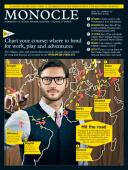
Issue 70
Chart your course: where to head for work, play and adventures. The villages, cities and nations that need to be on your travel schedule for 2014 and beyond, all revealed in our worldwide forecast.
In This Issue
Oops! No content was found.
Looks like we no longer have content for the page you're on. Perhaps try a search?
Return Home

